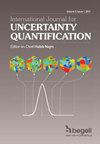Bayesian Parameter Inference for Partially Observed Diffusions using Multilevel Stochastic Runge-Kutta Methods
IF 1.8
4区 工程技术
Q2 ENGINEERING, MULTIDISCIPLINARY
International Journal for Uncertainty Quantification
Pub Date : 2024-06-01
DOI:10.1615/int.j.uncertaintyquantification.2024051131
引用次数: 0
Abstract
We consider the problem of Bayesian estimation of static parameters associated to a partially and discretely observed diffusion process. We assume that the exact transition dynamics of the diffusion process are unavailable, even up-to an unbiased estimator and that one must time-discretize the diffusion process. In such scenarios it has been shown how one can introduce the multilevel Monte Carlo method to reduce the cost to compute posterior expected values of the parameters for a pre-specified mean square error (MSE); see \cite{jasra_bpe_sde}. These afore-mentioned methods rely on upon the Euler-Maruyama discretization scheme which is well-known in numerical analysis to have slow convergence properties. We adapt stochastic Runge-Kutta (SRK) methods for Bayesian parameter estimation of static parameters for diffusions. This can be implemented in high-dimensions of the diffusion and seemingly under-appreciated in the uncertainty quantification and statistics fields. For a class of diffusions and SRK methods, we consider the estimation of the posterior expectation of the parameters. We prove that to achieve a MSE of $\mathcal{O}(\epsilon^2)$, for $\epsilon>0$ given, the associated work is $\mathcal{O}(\epsilon^{-2})$. Whilst the latter is achievable for the Milstein scheme, this method is often not applicable for diffusions in dimension larger than two. We also illustrate our methodology in several numerical examples.使用多级随机 Runge-Kutta 方法对部分观测扩散进行贝叶斯参数推断
我们考虑的问题是对部分离散观测的扩散过程相关静态参数进行贝叶斯估计。我们假设无法获得扩散过程的精确过渡动态,甚至无法获得无偏估计器,因此必须对扩散过程进行时间离散化。在这种情况下,已经证明了如何引入多级蒙特卡罗方法,以降低在预先指定的均方误差(MSE)下计算参数后置期望值的成本;见 \cite{jasra_bpe_sde}。上述方法依赖于欧拉-马鲁山离散化方案,该方案在数值分析中具有众所周知的缓慢收敛特性。我们采用随机 Runge-Kutta (SRK) 方法对扩散的静态参数进行贝叶斯参数估计。对于一类扩散和 SRK 方法,我们考虑了参数的后验期望估计。我们证明,对于给定的 $\epsilon>0$,要实现 $\mathcal{O}(\epsilon^{-2)$的 MSE,相关工作是 $\mathcal{O}(\epsilon^{-2})$。我们还通过几个数值例子来说明我们的方法。
本文章由计算机程序翻译,如有差异,请以英文原文为准。
求助全文
约1分钟内获得全文
求助全文
来源期刊

International Journal for Uncertainty Quantification
ENGINEERING, MULTIDISCIPLINARY-MATHEMATICS, INTERDISCIPLINARY APPLICATIONS
CiteScore
3.60
自引率
5.90%
发文量
28
期刊介绍:
The International Journal for Uncertainty Quantification disseminates information of permanent interest in the areas of analysis, modeling, design and control of complex systems in the presence of uncertainty. The journal seeks to emphasize methods that cross stochastic analysis, statistical modeling and scientific computing. Systems of interest are governed by differential equations possibly with multiscale features. Topics of particular interest include representation of uncertainty, propagation of uncertainty across scales, resolving the curse of dimensionality, long-time integration for stochastic PDEs, data-driven approaches for constructing stochastic models, validation, verification and uncertainty quantification for predictive computational science, and visualization of uncertainty in high-dimensional spaces. Bayesian computation and machine learning techniques are also of interest for example in the context of stochastic multiscale systems, for model selection/classification, and decision making. Reports addressing the dynamic coupling of modern experiments and modeling approaches towards predictive science are particularly encouraged. Applications of uncertainty quantification in all areas of physical and biological sciences are appropriate.
 求助内容:
求助内容: 应助结果提醒方式:
应助结果提醒方式:


